By Austyn Gaffney, Smart Cities Dive —
Dive Brief:
- Providence, Rhode Island, Mayor Jorge Elorza last week signed an executive order creating a city commission to develop recommendations on how to facilitate reparations payments.
- Within three months, the Providence Municipal Reparations Commission will study reparation work other U.S. cities have done, reach out to the community and create a strategy on how to use American Rescue Plan funds to facilitate direct payments to residents.
- The mayor said in a statement that the commission “brings us another step closer to addressing the disparities our African heritage and Indigenous residents continue to face.” It follows a path laid by other cities, including St. Paul, Minnesota, and the Chicago suburb of Evanston, Illinois.
Dive Insight:
Providence’s commission comes almost two years after an initial executive order established a truth and reconciliation group, kick-starting a process of repairing the damage done by the capital city’s role in enslavement and systemic racism against Black and Indigenous people, and people of color. The new commission will address the harm the committee describes in the nearly 200-page “Matter of Truth” report detailing Providence’s 400-year history of racial inequity.
Other cities, including several in the Midwest, have taken similar steps to document and make amends for histories of systemic racism.
In 2019, Evanston created an Empowerment Commission to fund reparations through a marijuana tax capped at $10 million. In 2021, this led to a $400,000 reparations payout, with $25,000 distributed to Black families for home repairs or down payments on houses. Last year, St. Paul, Minnesota, passed a resolution to create a reparations commission.
Additional cities are following suit, including Boston, where three city council members introduced an ordinance last month to form a reparations committee, and Detroit, where residents voted yes on a November resolution to form a reparations task force. In Newark, New Jersey, the city council is pushing reparations toward the statehouse, asking legislators to create a state reparations task force.
Some mayors, including Elorza, formed a coalition last year called Mayors Organized for Reparations and Equity (MORE).
Despite this momentum among some city governments, reparations have yet to make progress at the federal level. The late U.S. Rep. John Conyers, D.-Mich., began the first of multiple attempts in 1989 to establish a nationwide commission on reparations.
Some experts believe the U.S. could be at a turning point, however.
“Recently, especially after the murder of George Floyd and others in 2020, the U.S. appears to be engaged in a moment of reckoning with a strong sense of a moral obligation to act,” said Jessica Cruz, managing director of “Crafting Democratic Futures,” a nationwide project to develop research-informed reparations plans, with her local program operating out of the University of Michigan’s Center for Social Solutions.
But William Darity, a professor of public policy at Duke University, said city- and state-level initiatives are “a mistaken attempt to try and address a problem that has to be dealt with at federal level.” Absent a federal plan, Darity said, these municipal or state plans shouldn’t call their compensation plans “reparations.”
“A central objective of any kind of reparations plan for Black Americans whose ancestors were enslaved in the U.S. is the elimination of [the] racial wealth gap, which is distinct from income, and is the best cumulative economic indicator of the intergenerational effects of racial injustice,” Darity said.
Darity said closing the wealth gap for the 40 million Black Americans who qualify would cost the country $14 trillion – four times more than the budgets of all the states and municipalities in the U.S. combined, making it something only the federal government could undertake. Rather than call these smaller programs reparations, he suggests local officials call them “racial equity initiatives,” he added.
Cruz said her organization fully acknowledges the role of the federal government in reparatory programs, while also believing “that national action often follows the strategic work of local actors,” citing the civil rights movement as an example. In an email, Cruz said the Providence commission, along with others nationwide, “could indeed help address racial inequities.”
Source: Smart Cities Dive















